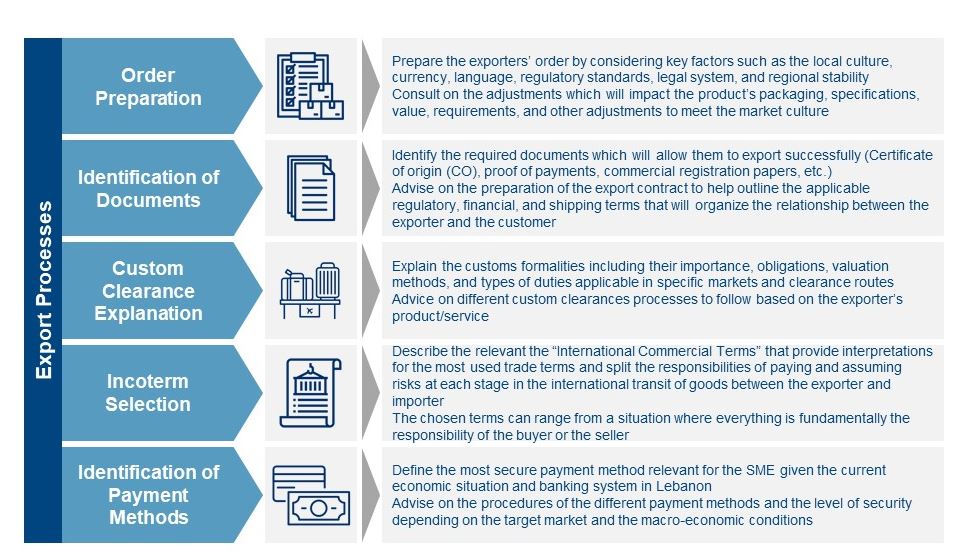Strategic Support to Lebanese Businesses Eyeing Exports
As Lebanon continues to suffer a worsening financial crisis threatening its stability, businesses are struggling to maintain their positioning in the local and domestic markets. In a recent publication, the World Bank reports on the Lebanese economic crisis as one of the most severe depressions in modern history. This has inevitably resulted in a negative impact on the performance of local businesses that are shifting their focus to regional and international markets to secure their sustainability, despite multiple challenges including increased production costs, inefficient provision of public services, difficult trade logistics, and significant barriers to entry to foreign markets. Lebanon also suffers a major trade deficit by relying on inflows rather than boosting exports to finance its imbalances. The Observatory of Economic Complexity (OEC) reports that in 2019 alone, the gap between exports and imports widened significantly, with total exports amounting to $4.07 billion, and imports amounting to $16.1 billion. In Q1 of 2020, Lebanon’s trade deficit narrowed down to $2.59B. Total exports also declined 3.3% by April 2020. This can be attributed to the currency deterioration and worsening financial circumstances. Despite these conditions, local businesses display a propensity for potential growth by accessing foreign markets.
To this end, the Euromena Consulting team in Lebanon is engaged in supporting Lebanese businesses to access new markets by prioritizing strategies that capitalize on existing potential and scan opportunities in target markets both regionally and at a global level. In doing so, the team is actively supporting business owners to determine potential markets to access and sustain their business and identify potential partners in the targeted markets. To close the chain, the team supports in developing export strategies that promote specific products or services to key markets. These are three key ways in which businesses are being supported:
1) Identifying Potential Markets:
As a start, businesses are advised to determine potential markets to sell their products or services. This depends largely on the industry and the local demand in the target country and by considering all relevant legal or regulatory requirements that promote or inhibit the trade of the target product or service. A comprehensive overview of the industry, its maturity, and the competition in the market is conducted, allowing the business to understand key strengths and weaknesses, and the barriers to enter and exit. The Euromena Consulting team has analyzed potential markets in over 60 countries across the GCC, Africa, Europe, and the US.
2) Determining Potential Partners, Clients, or Retailers:
After assessing the markets and identifying the best option to access, it is important to identify the potential partners, retailers, wholesalers, and distributors. Understanding the partners' product lines, performance, presence, market share, strategic vision and mission, will allow the business to be more targeted and selective. The exporter will explore how their products or services will reach the target customers. Some businesses may choose to sell wholesale or retail. Others will choose to partner with an agent or distributor. In specific cases, businesses may set up a representative office, branch or enter a joint venture. The choice is based on evidence of the business’s capabilities, their export strategy, the export requirements of the target market, and other economic factors that may drive growth and opportunity in each market. Over the last year, the Euromena Consulting team has supported businesses in identifying hundreds of potential distributors and clients, exploring different export pricing strategies with them, and negotiating the relevant terms applicable in the selected market.
3) Planning the Export Processes:
Once a market is identified and potential partners, clients, or retailers are analyzed, the final phase is to plan the export process. This step is crucial to provide the business with an overview of their selected export strategy, how they plan to mitigate risks, market their brand locally, and identify required resources in terms of additional human resources/capabilities or any needed investments in new systems or platforms to support in the expansion phase, such as accounting systems, customer relations, digital platforms, etc.
For this phase, there are five major steps that the business needs to consider:

In light of the economic crisis the country is facing, Lebanese businesses would benefit from having a clear, evidence-based export strategy. The situation calls for businesses to orient themselves to external markets and rely on global supply chains to continue operating and attract foreign currency to Lebanon. Further support is therefore required to enable business growth as companies face both financial and structural challenges related to trade inefficiencies and the repercussions of the worsening economic crisis. This will ultimately facilitate business owners to explore their untapped potential, reduce pressure on the trade deficit, attract foreign customers, create jobs, and boost economic activity.
By Poliana Geha, Senior Consultant & Jawdat Chakaroun, Senior Consultant at Euromena Consulting